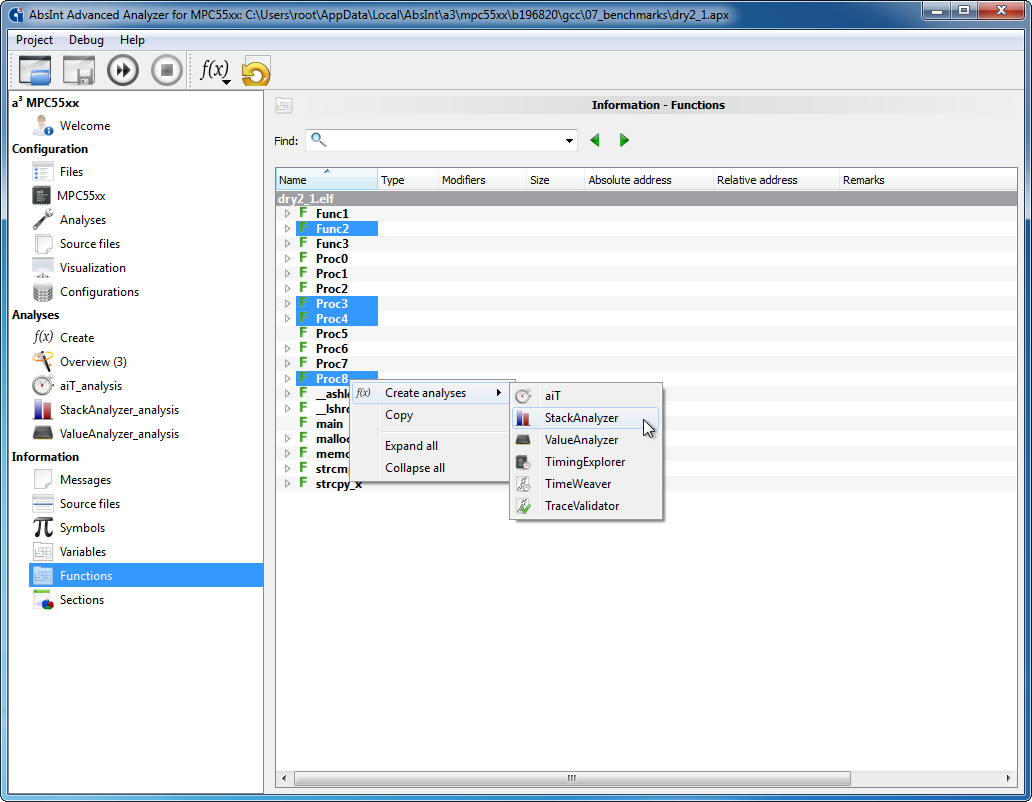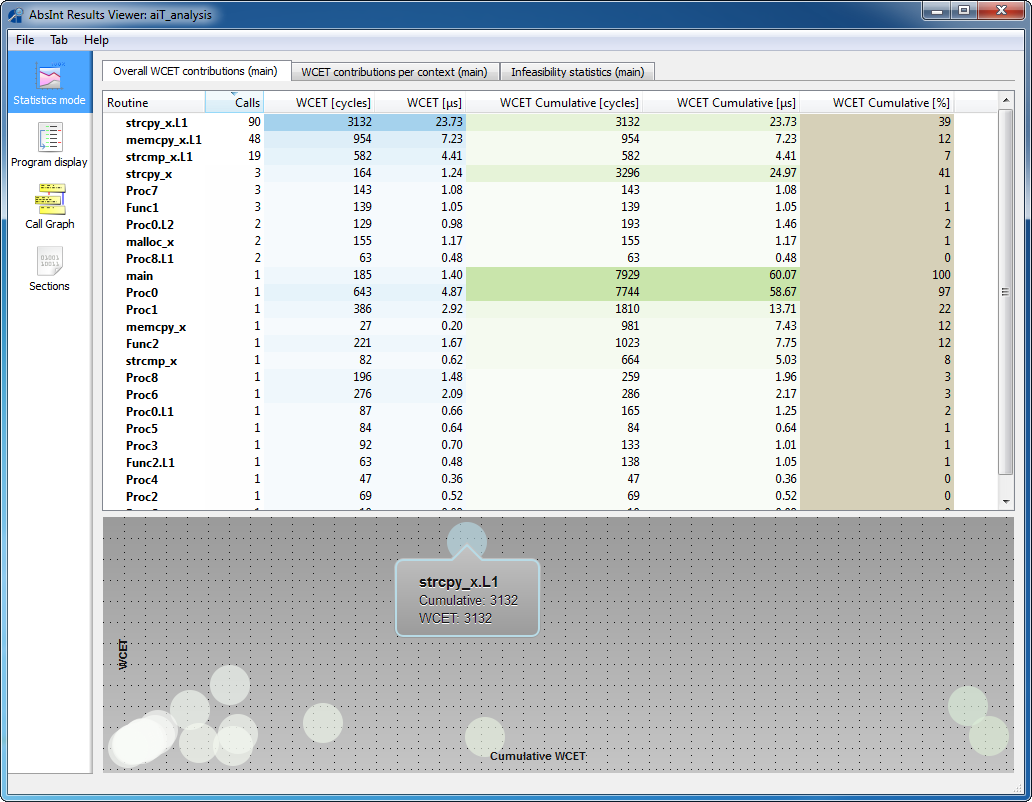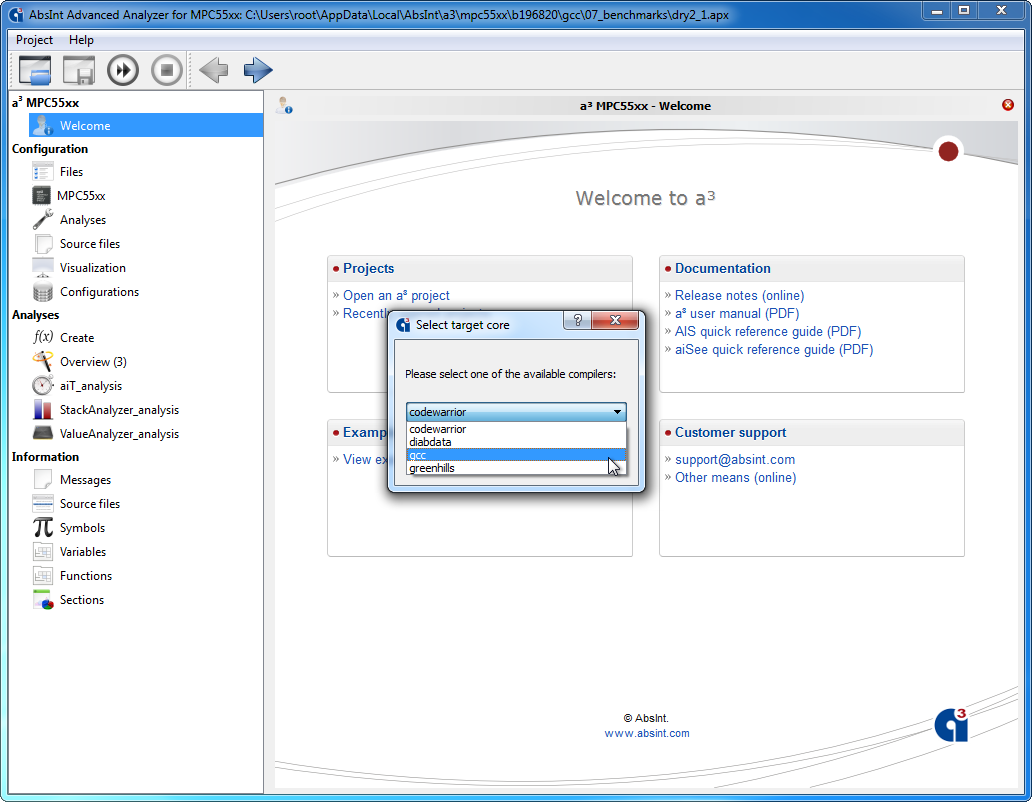 Multiple analyses |
 Improved Results Viewer |
 Improved compiler selection |
Targets
- a³ for C28x is now available, offering WCET analysis, stack usage analysis, and value analysis for TMS320F2808.
- aiT, StackAnalyzer and ValueAnalyzer for TriCore now support the 1197 and 1767 derivates.
- StackAnalyzer and ValueAnalyzer are now available for FR81S.
Qualification Support Kits (QSKs)
- Baseline information about the qualified tool is now consistently listed in TOR, VTP, and generated qualification run report.
- Qualifygui truncates report file before start of each qualification run.
- A definition of test case dependencies has been added to the VTP.
GUI
- Results Viewer now shows the number of times a function is called on the WCET path in the contributions table. See screenshot.
- Better message output for analysis with additional starts. Analysis steps for one additional start are grouped together with additional start name in header in message view.
- It is now possible to create multiple analyses at once, from the Symbols or Functions views. See screenshot.
- The GUI highlights the exact location of an AIS parse error if possible.
- Now supporting XML report file for "Control Flow Visualizer".
- XTC: added support for additional aiT option
xml_style_sheet.
AIS
- It is now possible to modify register contents in speculative contexts
by means of an AIS2 annotation:
instruction <pp> enter|exit with speculatively: ... ;
- Access annotations for specific base registers are no longer supported. Examples:
global accesses restrict for base r10 to 0x1000..0x1fff; instruction 0x1000 accesses 0x1000..0x1fff for base r10;
Decoding
- Code duplication support for ARC, C33, H8, MPC5xx, MPC55xx, MPC56xx, PPC, TriCore, and x86.
- Improved support for delay slots.
- Delay slots will be code-duplicated for true and false edges (if not annulled) to allow for higher analysis precision.
- Improved decoding algorithm to reconstruct control flow graph.
- Improved decoding statistics:
- Loops no longer count as routines.
- Code-duplicated instructions are counted separately.
- Improved decoding if mixed branch/call to same routine occur.
- Improved "target is not analyzed" annotation.
- Improved diagnostic messages for conflicting AIS annotations: now linking to both AIS annotations in question.
- Improve loop type detection for architectures with delay slots or guarded execution.
- Added message numbers to output of unresolved computed calls and branches.
- Better handling of unresolved computed branches inside loops by loop transformation. They will now be included into the loop for better visualization.
- ARM:
- Added support for the ARM/Thumb VFPv3-D16 instruction set extension.
- Improved automatic resolving of switch tables (Thumb and GCC).
- C166: model traps as routine calls.
- C33: corrected memory sizes in AIS annotations.
- M68020:
- Fixed wrong decoding of the “DIVS.L <ea>, Dr:Dq” instruction. The wrong bits were extracted for the divisor operand, such that the extension word that is part of the divisor operand was erroneously decoded as an instruction of its own.
- Fixed missing distinction between “DIVS.L <ea>, Dq” and “DIVSL.L <ea>, Dr:Dq”.
- PPC: Support for HighTec GCC.
- Improved automatic resolving of switch tables (DiabData) and computed calls in general.
- Improve simplified mnemonics for VLE instructions.
- Support for extended PPC ISA sc/sync instructions, such as “sc 1”, “sync 1”, and “sync 2”.
- SPARC:
- Minor changes in assembly string for better readability.
trap_negativeis not interpreted as a function call anymore.
- TriCore: improved support for HighTec GCC.
- V850: support for HighTec GCC.
- x86: better support for GCC.
- The supported instruction set is that of the P5 architecture until the P54C implementation of Pentium, plus a few more modern instructions.
Stack and value analysis
- Improved StackAnalyzer precision by defaulting to
max-length = 2. - StackAnalyzer will compute the maximum usages for the individual stacks (e.g. user stack, system stack,…) separately.
- XML report for StackAnalyzer now contains additional information such as the stack layout of the architecture.
- Busy-waiting loops without volatile annotation found are no longer warnings.
- Speculative accesses for infeasible blocks now show up in the context-insensitive access information of the text and xml reports.
- Improved precision of feasibility check for the targets of conditional and computed control flow transitions, e.g. switch tables.
- Improved loop-bound diagnostic messages, now linking to the AIS annotations that have an effect on the loop in question.
- Improved precision of warnings issued by consistency checks for contents of memory cells annotated as constant.
- Improved error messages for stack modifying loops.
- Improved loop range computation.
- Improved error messages for contradictions of analyzed value with specified value, now including AIS annotation location.
- Improved comments about accessed symbols/variables in text report file.
- ARM:
- Improved stack analysis for GNU C/C++ compiler.
- Support ARM/Thumb VFPv3-D16 instruction set extension.
- C28x:
- A
[?]is printed to the report file instead of[X..Y] if Y-X >= 4*64k(i.e. the interval spans over 19 bits of address space). - The analyses themselves use the interval
[X..Y].
- A
- PPC: improved stack analysis if frame pointer is used by the compiler.
- TriCore: improved loop analysis.
- V850
- Improved loop analysis.
- Improved StackAnalyzer precision for GHS compiler.
- Improved branch splitting if addi is used as a compare instruction.
- x86
- The supported instruction set is that of the P5 architecture until the P54C implementation of Pentium, plus a few more modern instructions.
- Improve stack analysis precision for GCC compiled binaries (support frame pointer save + restore).
Cache and pipeline analysis
- Improved prevision of cache analysis in general.
- Improved detection of possible state explosions.
- aiT for MPC55xx, LEON2, MPC56xx, and MPC603e can now take cache-related preemption costs into account. This is done by the so-called Useful–Cache-Block analysis.
- C33: corrected pipeline behaviour for delay slots in slow memory.
- MPC603e: added support for e300 instruction fetch burst extension.
- MPC755s/PPC750/MPC603e/MPC7448s:
- Improved memory consumption of generic MCU model.
- Add support for different burst length values for SDR IC accesses.
- Implemented non-ECC. Implemented configurable ECC width (8, 16, 32, 64 bits).
- MPC7448(s): removed unsupported DRTRY Mode Option from GUI.
- TriCore TC1796: improved handling of stores to cached EBU memory.
- Tricore TC1797: improved analysis behavior in terms of memory consumption and computation time.
Visualization and reporting
- Execution count of routines on the WCET path is now exported to the XML report file as "count" attribute (global and per context).
- UCB analysis results are now exported to the XML report file.